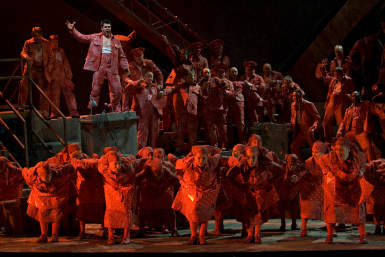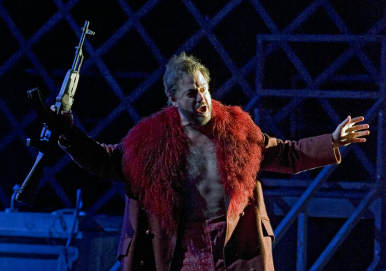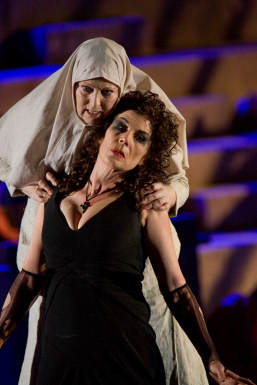|
Editorial Board
Melanie Eskenazi Webmaster:
Bill
Kenny
|
Seen and Heard Opera Review
Cast
The great flaw in this English production was performing the work without surtitles : when 90% of the words are inaudible, seeing them printed would have been helpful. Though Tom Randle, Peter Hoare and Adrian Thompson could all be heard clearly, almost every other singer was unintelligible, straining attention to the limit and making the evening exhausting.
The harsh conclusion about such singing would say that hardly anyone was adequate to their tasks, but it may be that balance with the orchestra was the real problem: Khovanshchina's cast is substantial and the work needs a large orchestra and chorus. While Lothar Koenigs seemed to manage the orchestra adequately and while some of the music is certainly loud, requiring the soloists and chorus to sing constantly at full tilt meant that diction went out of the window. Surtitled Russian would be easier on the ears.
It's a grim story set to marvellous music and David Pountney
sees it as relevant to the modern world - to Putin's Russia
and to the rise of religious extremism as a force in modern
politics. Quite why that thought makes him set the action
in post-revolutionary Russia is something of a mystery
however, since more immediately relevant times and locations
spring to mind fairly easily.
As an interpretation of Mussorgsky's historical setting, David Pountney's idea is reasonable if not exactly bold. The set is cluttered with heaps of debris and there's a great deal of extraneous stage business, which not only takes liberties with the text - why is the Scribe hoisted up on a hook to retrieve a very small book containing the 'proclamation' that the chorus sings about in Scene 1 for instance? - but which adds to the confusion created by the generally poor diction. Despite its attractive music, Khovanshchina doesn't need these discomforts: added up they make a long 3½ hours.
Bill Kenny
Back to the Top Back to the Index Page |
| ||
|
||||





